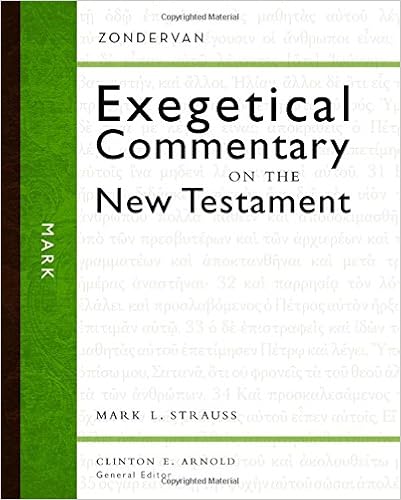
Mark
(Zondervan Exegetical Commentary on the New Testament)
Vol. 2 by Mark L. Strauss
This newer commentary set put out by Zondervan is an
excellent series, and this volume on Mark by Mark L. Strauss is no
different. Many of you will no doubt
recognize Strauss, as he has labored in the field of NT studies for many years,
producing substantial works on the gospels, choosing a translation of the
bible, and his newest work is on paradoxes in the Bible. This work, coming in at the hefty weight of
784 pages, leaves no stone unturned as Strauss covers introductory matters,
textual issues, commentary, and theology.
The helpful layout of the book made for easy reading in that you could
looking at the Scripture and Mark’s commentary alongside each other, comparing
notes and engaging the original text in an accessible manner.
What I particularly enjoyed about this commentary
was its judicious balance of weighing the importance of Mark’s narrative alongside
cultural and grammatical insights. While
Strauss bears witness to the importance of the term “gospel” for a Greco-Roman
audience (enthronement of a king or emperor’s birthday), he helpfully points us
to the OT usage where Isaiah envisions a time where the sovereign reign of God
over the cosmos would endure and this would be predicated by peace (60). Strauss goes onto to connect this theme with
Jesus’ preaching on the kingdom of God.
While it is important to stress the Greco-Roman usage of gospel, Strauss
helpfully steer us toward the ensuing narrative where John Mark talks about
preparing for the messenger who will prepare the way for Jesus. This overarching narrative of God’s act of
bringing his kingdom with a King is part and parcel of what it means that
salvation is near.
In terms of the more disputed matters, Strauss take
Markan priority, he sees Mark 16.9-20 as not part of the original text, and he
focuses in on discipleship and Christology as providing the main lens in which
to view Mark. His scholarship is
impeccable, wide-ranging and fair to opposing sources. He references the Qumran scrolls, looks at
cultural elements from Homer to rabbinic interpretations and carefully engages
the latest NT scholarship.
I hope you will enjoy this volume and be encouraged
by its words.
Comments
Post a Comment